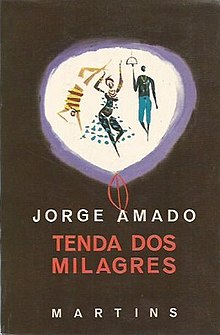Tent of Miracles (novel)

First edition
|
|
| Author | Jorge Amado |
|---|---|
| Original title | Tenda dos Milagres |
| Country | Brazil |
| Language | Portuguese |
| Publisher | Martins, Sao Paulo, Brazil |
|
Publication date
|
1969 |
|
Published in English
|
1971 |
Tent of Miracles (Portuguese: Tenda dos Milagres) is a Brazilian Modernist novel. It was written by Jorge Amado in 1967 and published the following year. It was later adapted to a 1977 Cinema Novo (Nouvelle Vague) film by director/screenplay writer Nelson Pereira dos Santos.
Tent of Miracles was written three years after the military overthrew Brazilian democracy, and it is part of a series Amado called "The Bahia Novels", works exploring the region's past. The novel chronicles the chaos that results when a prominent Columbia University professor arrives in Brazil, with nothing but praise on his lips for a long-forgotten local Bahian writer and self-taught social scientist named Pedro Archanjo. The year is 1968, which Levinson announces is the centennial of Archanjo's birth, setting off a media stampede to figure out who Archanjo was so that they can profit from a celebration of his life. When a few people finally uncover who Arcanjo was and what he espoused, media barons and advertisers are horrified to discover that he was an Afro-Brazilian social critic, womanizer and heavy drinker who died penniless in the gutter. So, they invent their own Pedro Archanjo, which they hype in various advertising-driven events, enlisting some Brazilian academics who are as superficial and self-promoting as Levinson.
The novel moves back and forth between events in the life of the historical hero, Pedro Archanjo, and the present. Most of the characters are types that lend themselves to the author's relentless satire. The historical setting is the colorful old Pelourinho neighborhood of Salvador, Bahia, that flows down the hill from the main plaza, where Archanjo works as a lowly runner at the School of Medicine adjacent to the cathedral. The place of the title is the home of the hero and his best friend, Lidio Corro, which also serves as barber shop, cultural center, print shop and artist's studio. The historical sections explore Afro-Brazilian culture and racial discrimination. Author Jorge Amado once declared that "Brazil is a racial democracy", and the novel is consistent with that belief, because he situates all racism in the past.
...
Wikipedia
